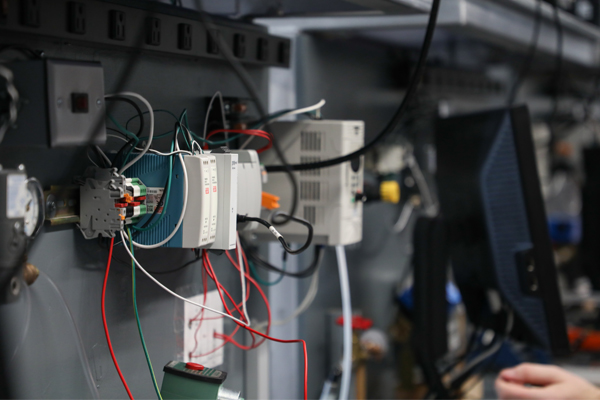
Electrical Engineering, B.S.
Learn to harness electricity for energy and information-delivery in a career-focused program where grads land great jobs.
Why Study Electrical Engineering at Montana Tech?
You’ll learn from industry-experienced—and connected—faculty passionate about your success. Nearly all your courses will include lab components taught by registered professional engineers who hold the highest degree in the field.
You’ll graduate ready to start your electrical engineering career or pursue a master’s degree in electrical engineering.
Focus on Real-Life Problems
Work with faculty on groundbreaking research that addresses real-world challenges.
For example, Montana Tech students helped develop a game-changing smart-grid system that won an R&D 100 Award—an “Oscar of Invention.” The honor placed Montana Tech among big-league research players like MIT and Stanford.
World-Class Electrical Engineering Labs
Learn to make electric power safer, more dependable, and more affordable in power-system laboratories at Montana Tech’s Natural Resource Research Center (NRRC).
Thanks to support from Schweitzer Engineering Laboratories—a top employer of Montana Tech grads—the NRRC houses state-of-the-art labs dedicated to protection, energy conversion, power plant systems, and training.
Electrical Engineering Internships
Gain hands-on experience with power, mining, oil, or consulting companies in Montana, across the country, or around the world. Most Montana Tech electrical engineering students land internships during their sophomore and junior summers.
Ideal Location for Study and More
Live and learn in Butte, an outdoor paradise. Six mountain ranges surround campus, with two nearby national parks and two rivers await weekend recreation.
Or join our student chapter of IEEE, the world’s leading professional association for technological advancement, or the NASA Robotic Mining Competition Club, which competes annually at Kennedy Space Center in Florida.
Student/Faculty Ratio
Emphasis on career outcomes
What Is Electrical Engineering?
Electricity efficiently transports energy and information. Electrical engineers discover how to harness electricity for the benefit of people and communities everywhere.
Electrical engineers design, develop, test, and supervise manufacture of electrical equipment. Their work is incredibly important. It powers homes and businesses, delivers information, makes food more available, and improves medical care and quality of life.
What Kinds of Jobs Do Electrical Engineers Get?
Montana Tech’s electrical engineering graduates work in the minerals industry, renewable energy, semiconductors, microprocessors, controls, consulting, and more.
Their employers include Idaho Power, Electrical Consultants Inc. (ECI), NorthWestern Energy, Power Engineers, and Schweitzer Engineering Laboratories (SEL). Some alumni go on to graduate school at Montana Tech or other institutions.
In demand for electrical engineers projected through 2028
For all working electrical engineers in 2020
My time in electrical engineering was fantastic. The department's close connections with industry leaders opened up doors to great internships and jobs for my classmates and me. We all had at least one job offer by the time we graduated.
Patrick Cote B.S. Electrical Engineering, 2018 M.S. Electrical Engineering, 2019
Explore Classes in Electrical Engineering
As an electrical engineering student, you’ll study topics like electrical grid stability, grid monitoring, power protection, and instrumentation and controls. You’ll also build foundations in the sciences, mathematics, and business and economics.
You might choose courses that focus on protecting the power grid from natural or human threats, energy conversion systems that link electricity supplies and uses, or telecommunications systems. See more course details in Montana Tech’s academic catalog.
Meet faculty, explore our research expertise, and more.
Explore other programs in engineering and related fields.
Get semester-by-semester info about electrical engineering courses.

Learn to design and build machines from small devices to spacecraft and prepare for an in-demand, high-pay career.

Build in-demand expertise in computing concepts, hardware, software, networking, and artificial intelligence.

Go further with advanced study of energy and power, automation and controls, signal processing, and instrumentation.
We can answer your questions and help you get started.
Department Head and Associate Professor
bhill@mtech.edu
406-496-4752